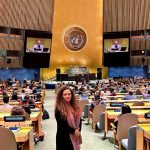By Raymond Ibrahim – Coptic Solidarity –
At a time when Saudi Arabia seems to be retracting from its longtime role of spreading Wahhabi (“radical”) Islam to the world, the Egyptian government has launched a project that indicates it wants to take on the mantle of overseer and disseminator of Islamic education and da‘wa.
An entire new city, alternatively known as “Islamic Mission City” or simply “New Islamic City,” was recently reported as being built in New Cairo, Egypt. With President Sisi’s full and enthusiastic support, its purpose is to accommodate thousands of more international students to study at Al Azhar University, commonly seen as the Muslim world’s most prestigious Islamic university, before going home and “sharing” their knowledge.
The new city is being built over 172 acres of land and will easily be able to hold about 24,000 extra students (with separate sections for 17,700 males and 6,000 females). One of the city’s mosques will be able to hold 1,500 worshippers.
This promises to be a major expansion from the current capacity of the two other “Islamic” cities in Cairo and Alexandria, which collectively house 3,000 students. All of them hail from around the world (according to the latest tally, 106 nations). Most of them are offered partial or full scholarships, including lodging, paid for from Al Azhar’s budget (currently 20 billion Egyptian Pounds) which is fully financed by the state, that is, by taxpayers—15% of whom are Coptic Christians (they who regularly experience Islamic teachings first hand).
Al Azhar’s schooling system—which is autonomous and does not fall under the supervision of Egypt’s ministry of Education—currently serves 2.6 million students (a number that grows every year). It offers courses from First Grade primary school to post-graduate studies.
This new “Islamic” city is quite the development. Not only does it underscore the degree to which Islam continues to play a major and growing role in the lives of Muslims—it is impossible, for instance, to find a similar development among Christians—but the connection to Al Azhar is further telling as to what sort of Islam will be taught to and eventually disseminated in the home nations of these many thousands of students hailing from 106 nations.
On the one hand, officialdom presents Al Azhar as the voice of “reason” and “moderation”—hence why Barack Hussein Obama chose that Islamic institution to give his “new beginning” speech in 2009. Of Al Azhar, he said:
For over a thousand years, Al-Azhar has stood as a beacon of Islamic learning…. As a student of history, I also know civilization’s debt to Islam. It was Islam – at places like Al-Azhar University – that carried the light of learning through so many centuries, paving the way for Europe’s Renaissance and Enlightenment.
On the other hand—that is, back in the real world—Al Azhar is the Muslim world’s most prestigious school precisely because it treats the study of rigorous Islam seriously and with care. It does not teach politically correct or “progressive” Islam—the sort of Islam the West dreams of—but authentic (fundamentalist) Islam.
Indeed, not a few Muslims, including former students, accuse it of promoting the same brand of Islam that terrorist groups such as ISIS live out. After being asked why Al Azhar, which is in the habit of denouncing secular thinkers as un-Islamic, refused to denounce the Islamic State as un-Islamic, Sheikh Muhammad Abdullah Nasr said:
It can’t [condemn the Islamic State as un-Islamic]. The Islamic State is a byproduct of Al Azhar’s programs. So can Al Azhar denounce itself as un-Islamic? Al Azhar says there must be a caliphate and that it is an obligation for the Muslim world [to establish it]. Al Azhar teaches the law of apostasy and killing the apostate. Al Azhar is hostile towards religious minorities, and teaches things like not building churches, etc. Al Azhar upholds the institution of jizya [extracting tribute from religious minorities]. Al Azhar teaches stoning people. So can Al Azhar denounce itself as un-Islamic?
Similarly, while discussing how the Islamic State burned some of its victims alive—most notoriously, a Jordanian pilot—Egyptian journalist Yusuf al-Husayni remarked that “The Islamic State is only doing what Al Azhar teaches.” He then pointed to a standard text (by Ibn Kathir) used by Al Azhar that extolls the exploits—or rather atrocities, including burning infidels alive—that Islam’s early heroes engaged in.
After two Coptic churches were bombed in Egypt, leaving 50 Christian worshippers dead, Dr. Islam al-Behery—a popular Muslim theologian whose incessant calls to reform Islam so irked Al Azhar that it accused him of “blaspheming” against Islam, leading to his imprisonment in 2015—was interviewed on the Egyptian television program (Amr Adib’s kul youm, or “Every Day”). After offering various details concerning the radicalized curriculum of Al Azhar, he estimated that “70-80 percent of all terror in the last five years [in Egypt] is a product of Al Azhar.”
According to a standard Al Azhar text that that al-Behery quoted from, “whoever kills an infidel [or kaffir, a non-Muslim] his blood is safeguarded, for the blood of an infidel and believer [a Muslim] are not equal.” (Here is how this discriminatory teaching regularly plays out in Egypt when Christians are murdered.)
Political commentator Dr. Khalid Montaser once marveled that, “at this sensitive time—when murderous terrorists rest on [Islamic] texts and understandings of takfir [accusing Muslims of apostasy], murder, slaughter, and beheading—Al Azhar magazine is offering free of charge a book whose latter half and every page—indeed every few lines—ends with ‘whoever disbelieves [in Islam] strike off his head’”?
One need look no further than to the head of Al Azhar—its Grand Imam, Sheikh Ahmed al-Tayeb, once named the “most influential Muslim in the world”—to understand what the university is all about. While saying one thing to the West—namely, what it wants to hear about “tolerance” and “coexistence,” as in the fraternal but farcical documents he and Pope Francis sign—he is (when speaking Arabic) on record legitimizing virtually everything that is otherwise dismissed in the West as a product of “radical” thinking, including the punishment of apostates and blasphemers, and the inferior status of women and religious minorities.
But when asked to denounce the Islamic State as “un-Islamic,” al-Tayeb refused: “It’s amazing,” opined Egyptian talk show host Ibrahim Eissa:
Al Azhar insists ISIS are Muslims and refuses to denounce them. Yet Al Azhar never ceases to shoot out statements accusing novelists, writers, thinkers—anyone who says anything that contradicts their views—of lapsing into a state of infidelity. But not when it comes to ISIS!
Al-Tayeb has also pronounced Christians and Jews as “infidels”—a rather deadly classification in Islam—and called on Muslims in the West not to assimilate but keep their Islam in their “hearts.”
Most recently, Al Azhar, under al-Tayeb’s leadership, issued a fatwa all but declaring open season on every Israeli citizen, with little by way of distinguishing civilians from combatants.
Now, a much greater number of Muslim minds from all around the world are set to be exposed to and ultimately indoctrinated in the same sorts of teachings that gave rise to ISIS, before returning to their countries of origin—from the U.S. to Indonesia, from South Africa to Oslo—where they will be in charge of spreading the message of fundamentalist Islam among otherwise “moderate” Muslims.





